Introduction
Artificial Intelligence (AI) is transforming consulting practices, offering unparalleled advantages and reshaping traditional methodologies. The integration of AI not only enhances efficiency and data analysis but also personalizes client solutions, enabling consulting firms to deliver more precise and strategic recommendations. By automating routine tasks, consultants can focus on high-value activities, optimizing resources and accelerating project timelines.
The ability of AI to process vast datasets quickly provides deep insights, driving informed decision-making and strategic forecasting. This article delves into the myriad benefits and key use cases of AI in consulting, explores AI-driven problem-solving and predictive modeling, and offers strategies for integrating AI into consulting practices. It also addresses the ethical considerations necessary for responsible AI use and examines future trends and opportunities that AI presents in the consulting industry.
Benefits of AI in Consulting
Incorporating AI into advisory practices provides numerous advantages, such as increased efficiency, better information analysis, and tailored solutions for customers. Firms leveraging AI can automate routine tasks, freeing consultants to focus on high-value activities, thereby optimizing resource allocation and accelerating project timelines. For instance, a Harvard Business School study revealed that consultants using AI tools completed tasks 25.1% faster and were 12.2% more productive than their non-AI counterparts.
AI-powered analytics enable deeper insights from vast datasets, driving informed decision-making and strategic recommendations tailored to client needs. This capability enables consultants to create predictive models that project future scenarios based on historical and real-time information, assisting businesses in anticipating market trends, customer behavior, and demand fluctuations. According to McKinsey, companies that fully leverage AI could see a 20-25% increase in cash flow.
Moreover, AI’s ability to process massive amounts of data quickly and accurately means consultants can easily extract valuable insights buried under complex datasets, providing data-driven recommendations and strategies. This leads to more informed decision-making and efficient problem-solving, particularly valuable in volatile markets.
Furthermore, AI-driven automation in advisory services can streamline various processes, such as supply chain management, logistics, and customer service through chatbots and personalized recommendations. As AI technology continues to evolve, its role in enhancing business operations and competitive advantage becomes increasingly significant. Despite concerns about the accuracy of AI outputs, it is important to note that human-based advice is also prone to errors, and all outputs should be checked for accuracy.
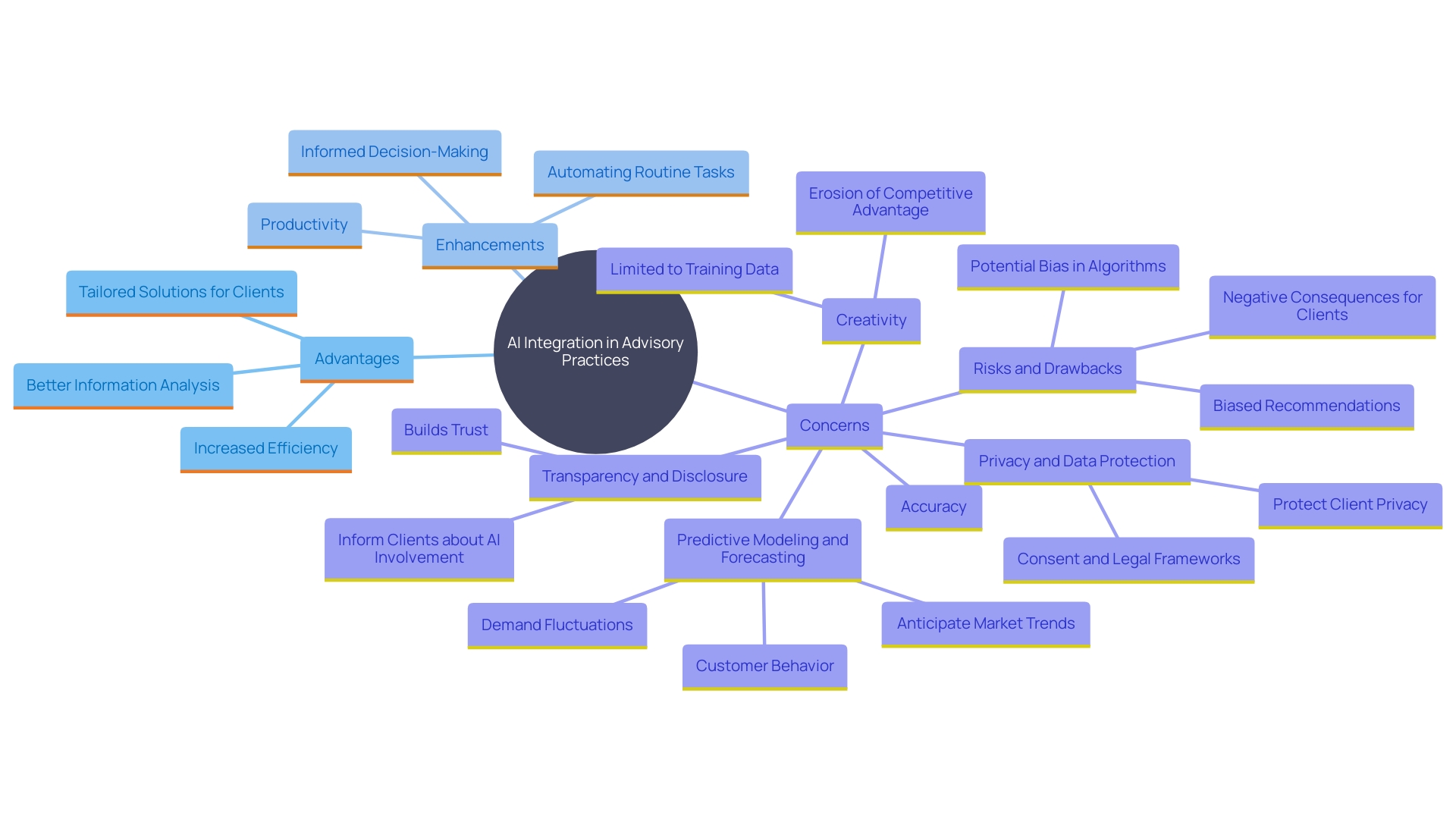
Key Use Cases for AI in Consulting
AI consulting companies are transforming multiple sectors by employing advanced AI solutions. In the financial services industry, Walles.Ai’s fraud detection algorithms have significantly reduced fraudulent activities by identifying anomalous patterns and suspicious transactions, safeguarding assets and enhancing customer trust. Similarly, in the manufacturing sector, Walles.Ai’s smart manufacturing capabilities have optimized production processes, increased employee productivity, and improved profitability by monitoring machine performance and streamlining workflows.
In healthcare, predictive analytics is enhancing patient care and optimizing resource allocation, showcasing Ai’s transformative potential. Additionally, AI-driven tools in market research provide actionable insights by analyzing consumer behavior and predicting trends. These tools allow companies to deliver targeted and measurable strategies, as shown by Marketbridge’s survey, which emphasized AI’s role in utilizing marketing and sales resources more cost-effectively.
Moreover, AI algorithms are crucial in risk evaluation and management by examining historical information to identify potential vulnerabilities. This capability is essential for businesses to anticipate market trends, customer behavior, and demand fluctuations, as noted by the Center for Economic Studies. The introduction of optimized AI applications is not only redefining efficiency but also expanding the technological frontier, empowering businesses to achieve greater operational efficiency, reduce costs, and enhance service delivery.
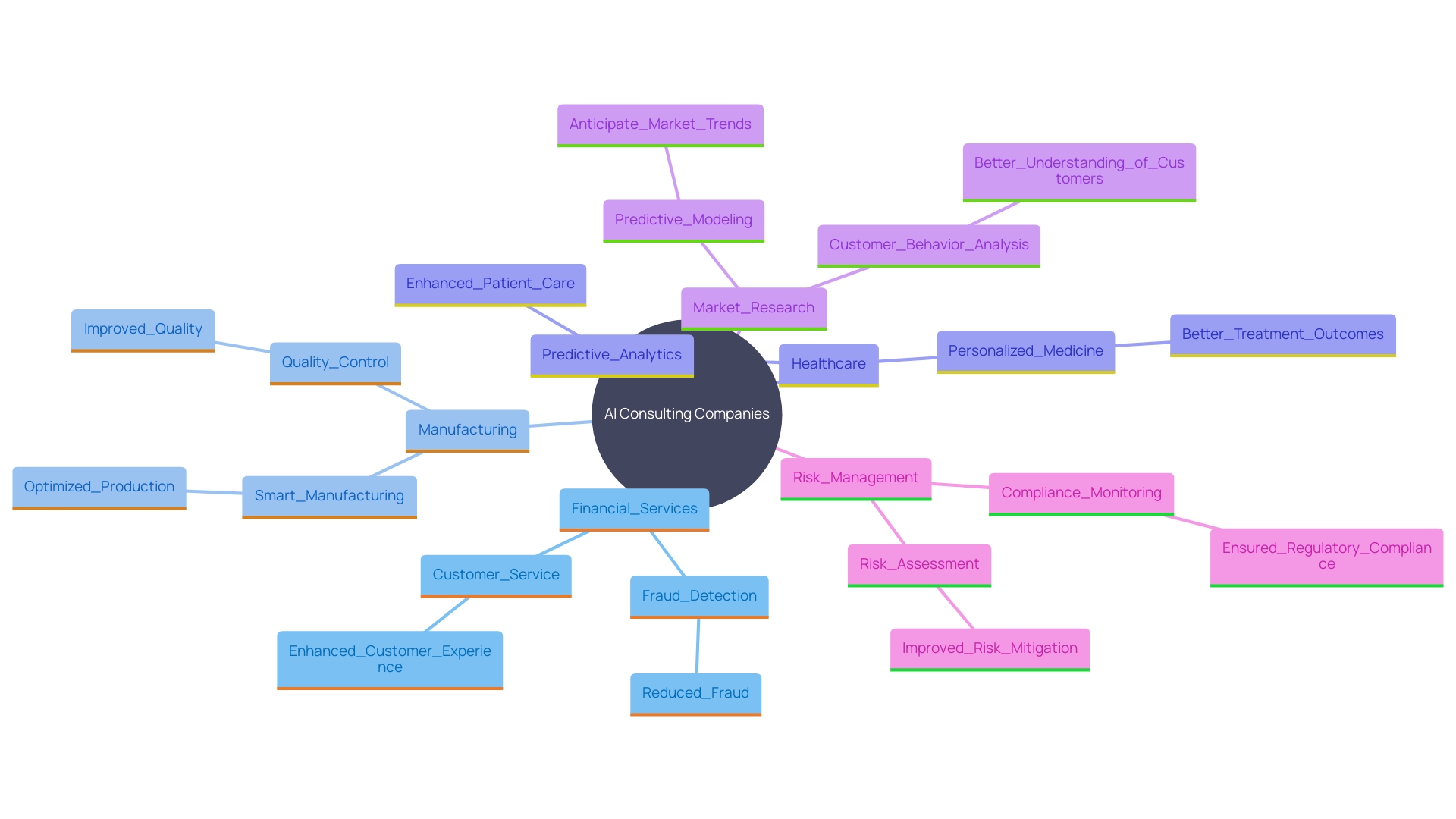
AI-Driven Problem-Solving and Predictive Modeling
‘AI technologies, such as machine learning and predictive analytics, have transformed advisory companies’ capability to address intricate issues with unmatched effectiveness.’. By leveraging predictive modeling, consultants can anticipate future scenarios based on both historical and real-time data. This empowers businesses to stay ahead of market trends, customer behavior, and demand fluctuations. For example, a professional services organization might utilize AI-based models to predict changes in market demand, allowing their customers to modify strategies in advance.
The effect of AI on advisory services is evident. In a study where consultants were tasked with developing new product ideas and writing extensive reports, those utilizing AI completed 12 percent more work at a 25 percent faster rate than their counterparts who did not use AI. This efficiency not only enhances client satisfaction but also establishes the advisory organization as a forward-thinking and trustworthy partner.
However, it’s important to note the potential risks associated with AI, such as algorithmic biases. Since AI models depend on available information, any biases within this information can be amplified, leading to skewed recommendations and decisions. Consequently, it is essential for advisory organizations to thoroughly assess their data providers to guarantee impartial and trustworthy results.
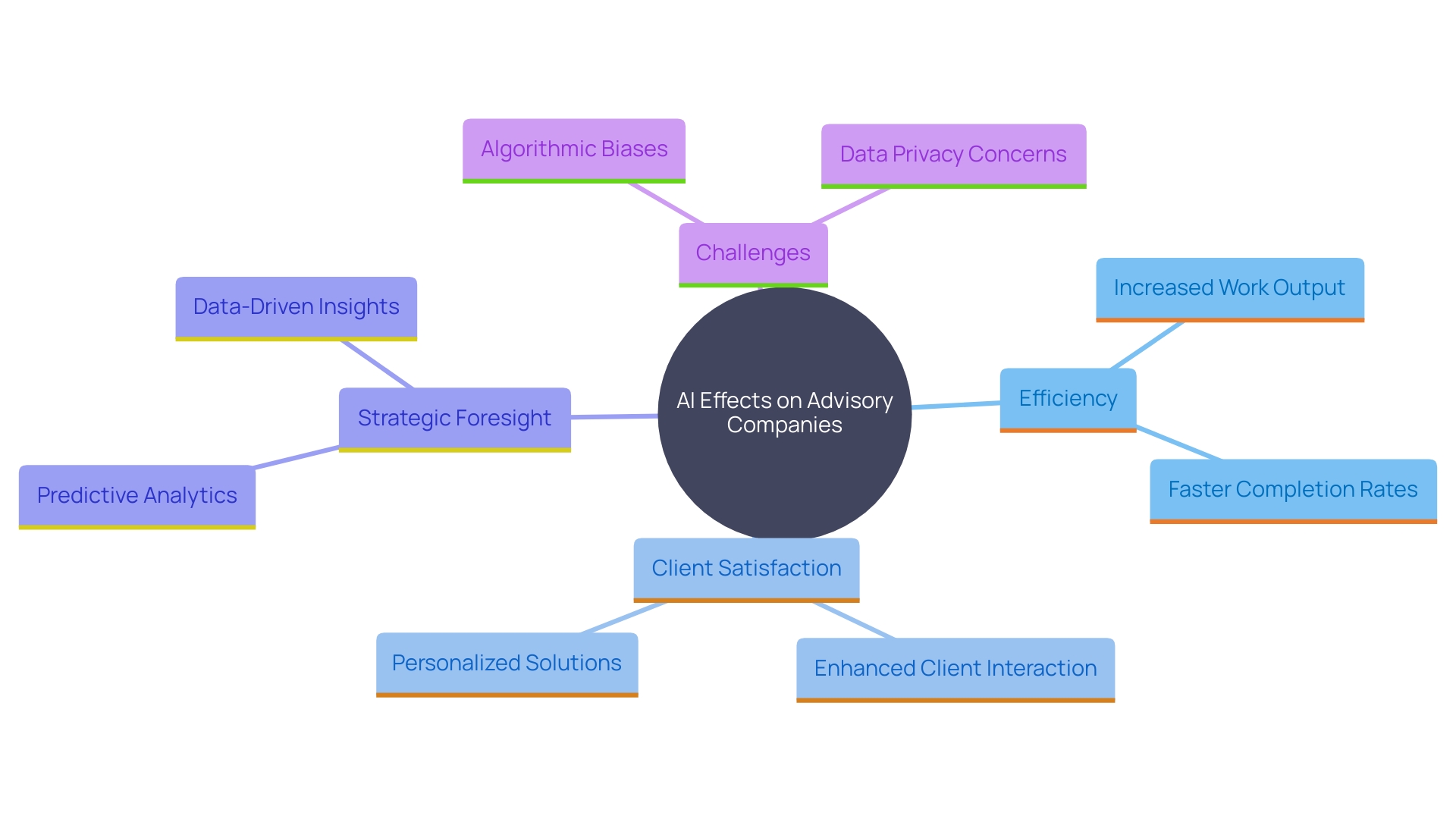
Strategies for Integrating AI in Consulting Practices
Successfully integrating AI in advisory services demands a strategic and methodical approach. At first, companies must carry out a thorough evaluation to pinpoint specific needs and identify areas where AI can provide significant value. Investing in the right AI technologies and tools is paramount, as evidenced by IBM’s success in helping over 4,000 entities transform efficiently and securely through their hybrid cloud platform and AI expertise.
Creating a culture of innovation is critical; this can be achieved through comprehensive training sessions, strategy documents, and best-practice guidelines, ensuring that employees are well-prepared to adopt AI technologies. In fact, knowledge transfer, including training and upskilling, is a fundamental component of any AI advisory engagement, equipping teams with the necessary tools and understanding to implement AI solutions effectively.
Furthermore, establishing strategic partnerships with AI technology providers can significantly enhance capabilities and expedite the implementation process. For instance, the swift adoption of AI among major companies, with 77% utilizing it to inform investment choices, highlights the significance of utilizing external expertise to enhance AI’s advantages.
By following these steps, advisory organizations can not only optimize business procedures and lower expenses but also attain a competitive advantage in their respective sectors.
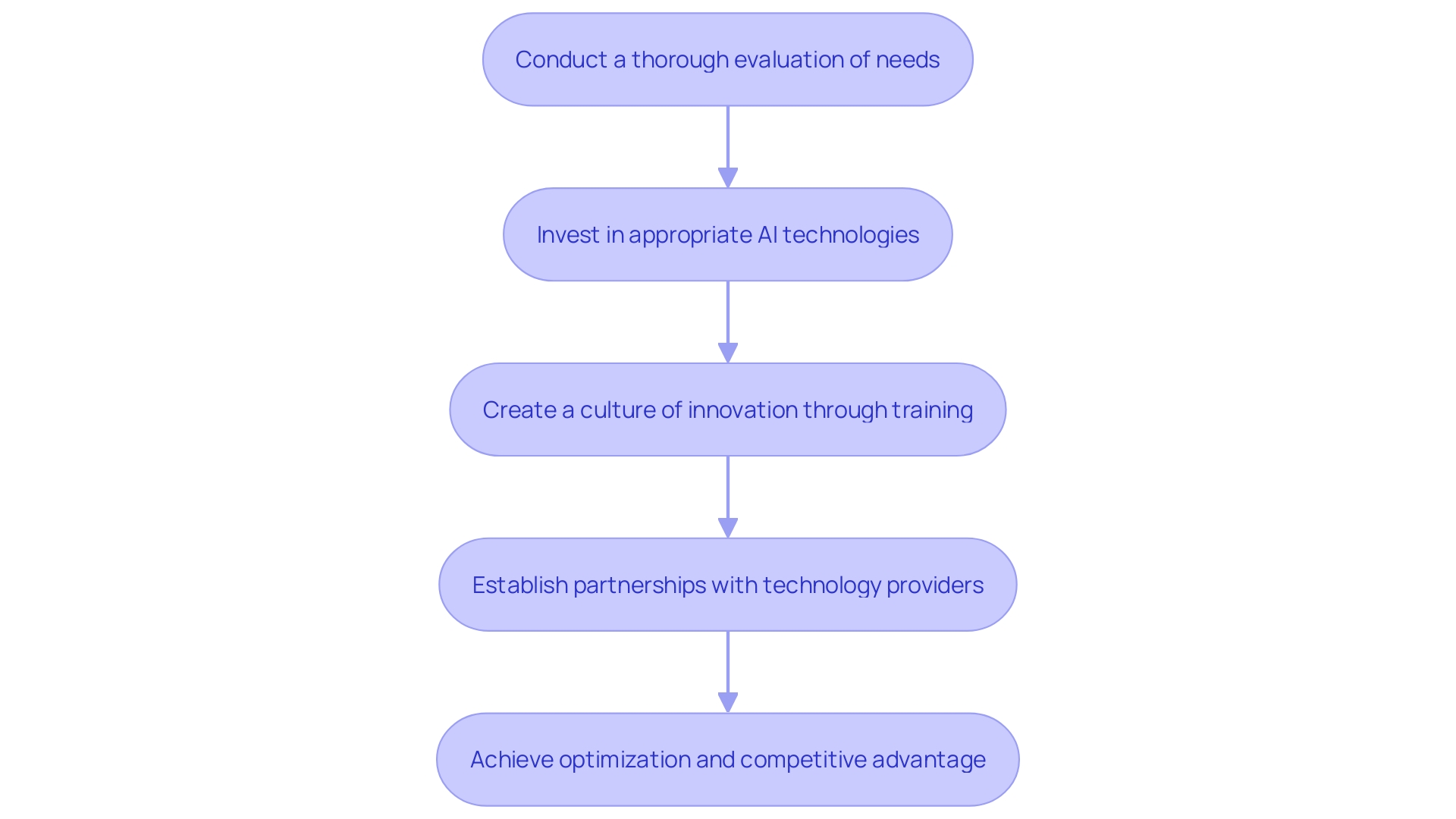
Ethical Considerations and Responsible AI Use
As consulting companies increasingly incorporate AI into their operations, ethical considerations must be at the forefront of their implementation strategies. Ensuring transparency in AI algorithms, protecting user data, and addressing bias in AI models are critical factors. To accomplish this, organizations should create thorough guidelines for responsible AI application, emphasizing ethical considerations and building trust with customers.
The importance of transparency cannot be overstated. Without clear guidelines, organizations can struggle to make informed decisions when faced with ethical challenges. For instance, Unilever’s approach involves both internal and external assessments to identify potential ethical and efficacy risks before deploying AI applications. Statistical tests are then conducted to detect any bias or fairness issues, ensuring the system’s efficacy in achieving its objectives.
Moreover, the lack of a global consensus on responsible AI principles poses a challenge. Different regions have varying ethical standards, making it difficult to establish a universal set of guidelines. This incongruence can influence the practical implementation of AI ethics within multinational firms. Companies must navigate these complexities by creating a framework that balances ethical decision-making with compliance across different jurisdictions.
Safeguarding client information is another essential facet of ethical AI deployment. As emphasized by researchers, there is an urgent requirement for increased public awareness about AI’s effect on information privacy. Companies often conceal the amount of information they gather and how it’s utilized, which can undermine public trust. Consequently, consulting firms ought to emphasize openness and responsibility in their information practices to establish and sustain trust with their customers.
Addressing bias in AI models is equally essential. Predictive modeling and generative AI can inadvertently perpetuate biases present in the training data, leading to biased recommendations and decisions. Companies must actively work to identify and mitigate these biases to ensure fair and equitable results for those they serve.
By prioritizing these ethical considerations, advisory firms can build a sustainable AI strategy that aligns with their values and fulfills customer expectations. This approach not only improves operational efficiency but also promotes long-term trust and cooperation with customers, ultimately driving success in the rapidly evolving AI landscape.
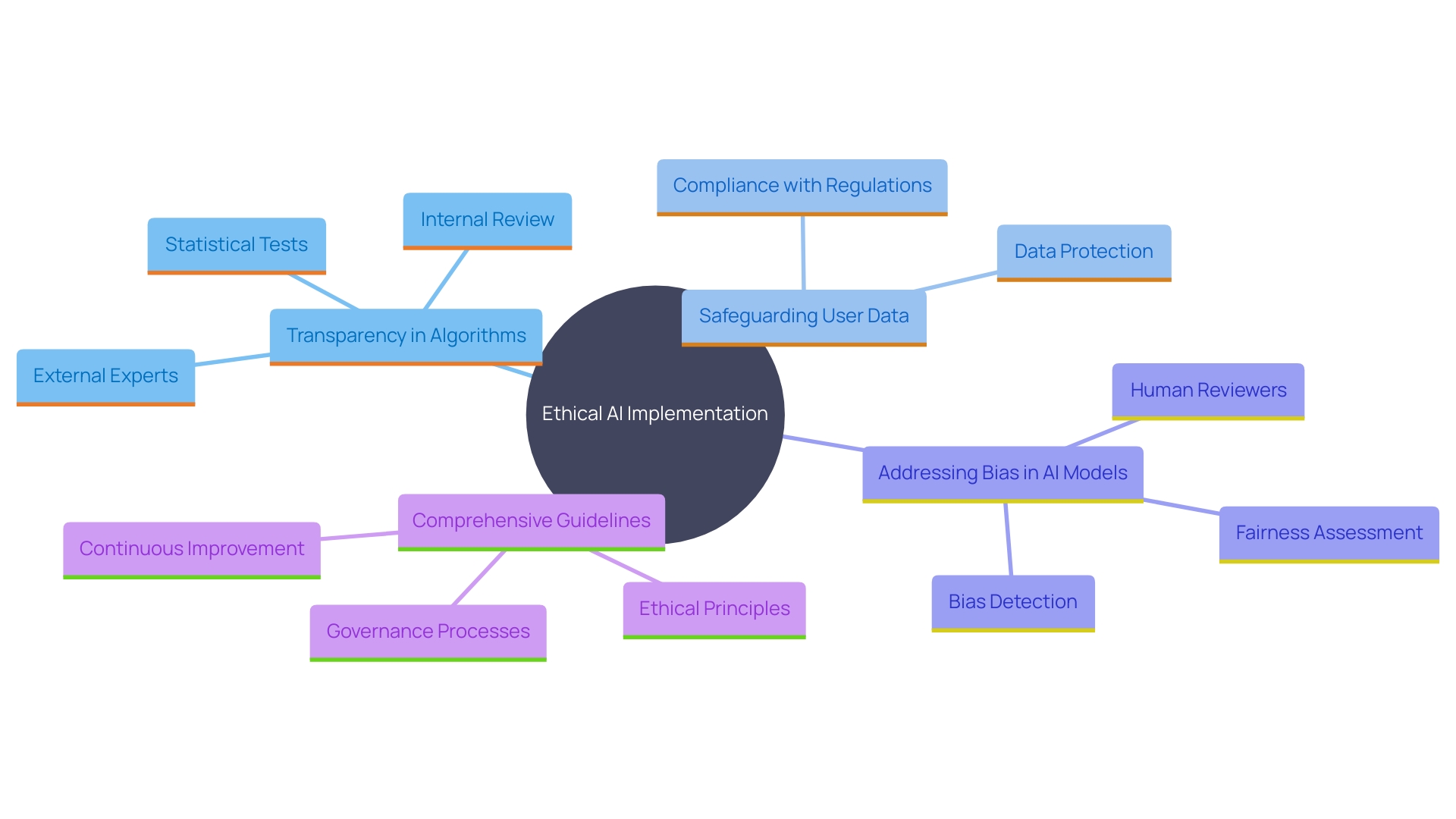
Future of AI in Consulting: Trends and Opportunities
The future of AI in advisory services is set for remarkable expansion, driven by cutting-edge technological advancements and the evolving demands of clients. As businesses navigate the complexities of globalization, digitalization, and changing regulations, AI has emerged as a pivotal tool in enhancing decision-making processes. Businesses are increasingly utilizing AI for purposes in digital transformation and sustainability, taking advantage of its capacity to analyze large volumes of information and create predictive models that anticipate future situations based on past and current data.
The introduction of generative AI models, such as OpenAI’s ChatGPT, has transformed the advisory landscape by enabling the creation of new content, such as text, images, and videos, that are virtually indistinguishable from human-generated outputs. This change has sped up the provision of advisory services, making them more efficient and innovative. However, it’s essential to address the potential biases in AI algorithms to ensure fair and accurate recommendations.
Possibilities are plentiful for advisory organizations to create AI-driven solutions that not only tackle present issues but also foresee upcoming requirements. This proactive approach positions companies as leaders in innovation and strategic advisory. ‘The integration of AI into advisory workflows requires a robust change management strategy and a willingness to embrace new approaches.’. As noted by industry leaders, developing a strategy for AI readiness is crucial for navigating the disruptive impact of technology and harnessing its potential to drive business growth and transformation.
In this dynamic environment, advisory groups that effectively implement AI technologies can achieve significant productivity gains, streamline operations, and enhance their organizational capabilities. The future of AI in consulting promises a landscape where firms that embrace these advancements will lead the way in delivering exceptional value to their clients.
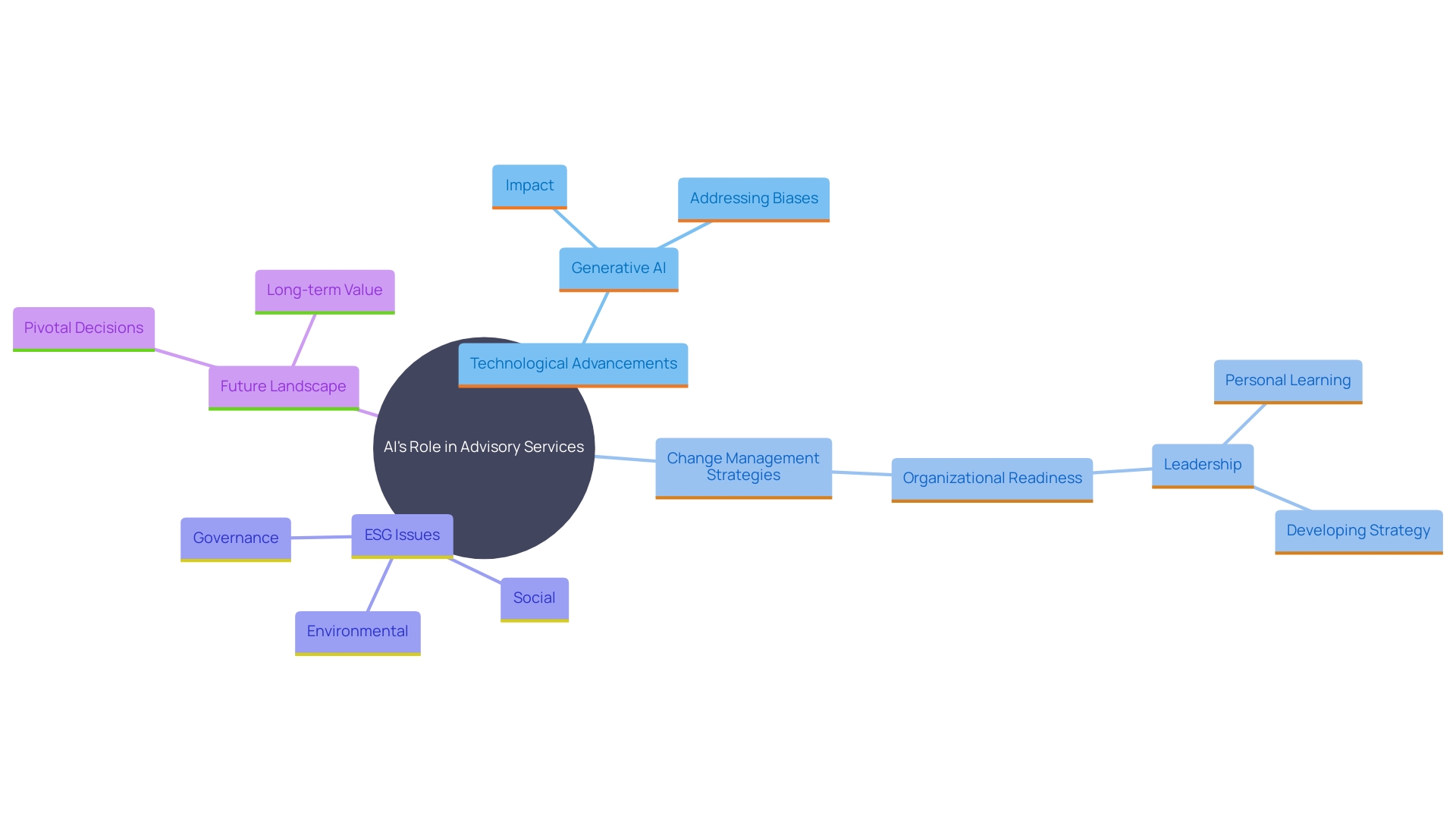
Conclusion
Integrating Artificial Intelligence into consulting practices significantly enhances efficiency, data analysis, and personalized solutions. By automating routine tasks, consultants can concentrate on high-value activities, optimizing resource allocation and accelerating project timelines. AI’s capability to analyze vast datasets provides deeper insights, leading to informed decision-making and tailored recommendations that boost productivity and client satisfaction.
Key applications of AI across sectors, such as fraud detection in finance and predictive analytics in healthcare, showcase its transformative potential. As firms rapidly adopt AI technologies, strategic partnerships and the right investments become essential for enhancing capabilities and maintaining a competitive edge.
However, the integration of AI also requires a strong focus on ethical considerations. Transparency in algorithms, data protection, and bias mitigation are critical for building trust and ensuring fair outcomes. Establishing comprehensive guidelines for responsible AI use is vital for navigating these challenges effectively.
Looking forward, the future of AI in consulting presents numerous opportunities. By embracing innovative technologies, firms can anticipate client needs and drive strategic growth. The effective implementation of AI not only promises productivity gains but also positions consulting firms as leaders in delivering exceptional value in a complex business landscape.

